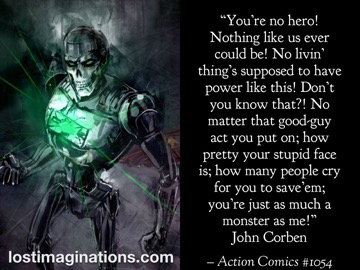Hero vs Villain

In “Power Like This,” Action Comics #1054 (2023), the villain, Metallo (John Corben) has kidnapped the Super Twins and threatens to kill them as revenge for losing the only family he has left; his sister, Tracey. However, this Metallo is different from the villain fans are used to reading in DC Comics. Instead, he is a supped up version of his former self, allowing him the ability to control inanimate metallic corpses.
Upon arrival into Corben’s death den, Superman immediately notices a difference in not only Corben’s abilities, but also his behavior. Rather than enter the room swinging fists to save the War World refugees, Superman tells Metallo, “Something’s affecting your mind. Maybe even controlling you. Let the kids go. I’ll help y--.”
Witnessing Superman’s concern for his well-being rather than anger for the actions of the villain makes Corben more enraged. Metallo drops the twins from his grasp and yells, “This is your fault! You’re no hero! Nothing like us ever could be! No livin’ thing’s supposed to have power like this! Don’t you know that?! No matter that good-guy act you put on; how pretty your stupid face is; how many people cry for you to save’em; you’re just as much a monster as me!” Yes, this is a fictional story in a superhero comic book. However, the interaction between Superman and Corben is very representative of differences between the thinking of victims and survivors.
While both survivors and victims have been victimized, survivors seek healing, not only for themselves, but often for others as well. Victimization can cause feelings of shame and negative automatic thoughts that they are dirty, ugly, and incapable of being anything more than a villain because of what was done to them. These individuals can also suffer the cognitive distortion of “all-or-nothing thinking,” believing that all individuals who have been victimized in the same manner as themselves must also view themselves in the same way. These thoughts can make it nearly impossible for victims to believe that healing is possible for anyone who has been victimized. This view of themselves as victims can be seen in the fictional words of John Corben when he says, “Nothin like us ever could be,” a hero. Meaning no one like us can ever heal. No one like us, who has had our innocence stripped away can ever be anything more than a victim or a villain.
Unfortunately, perpetrators can also use the same language in an attempt to keep their victims under their influence of control. Perpetrators attempt to make those they have victimized into believing they are, “just as much a monster as me!” Healing, growth, and love are all off the table because as a perpetrator they may have also been victimized and never allowed the opportunity to heal. The words of perpetrators and the cognitive distortions of those have been victimized may appear at face value to be true, but they are not. Healing is possible and everyone deserves the chance to heal from their past trauma to become a survivor. Everyone. This does not mean refusing to hold individuals accountable for their pat actions. Instead, it means allowing everyone the opportunity to heal from their past trauma in an attempt to break the cycle of abuse and become better versions of themselves. This belief is what Superman embodies as a hero. Yes, Corben did something wrong by hurting others and deserves to be held accountable for what he has done, but everyone also deserves to make amends for what they have done.